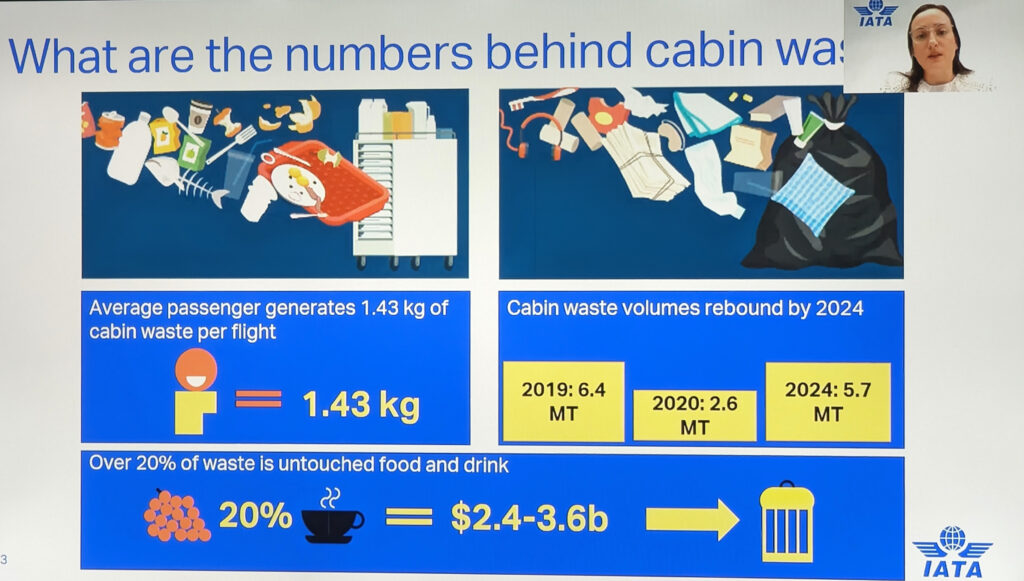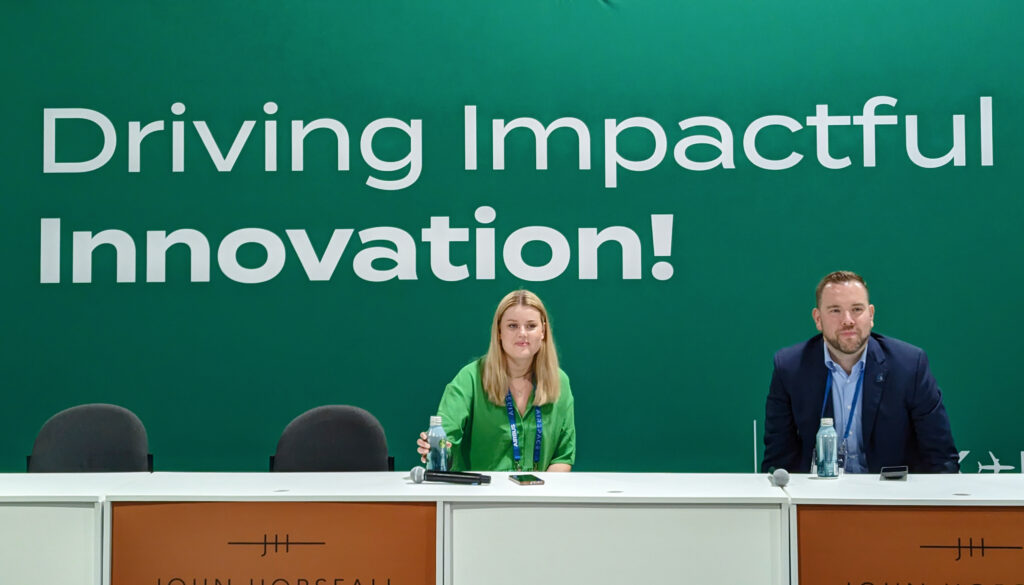From Single-Use Plastics to Edible Spoons: How Airlines Transform Cabin Waste
Share
A panel discussion called REvolutionize = REinvent + REcycle at IFSA / APEX EXPO kicked off with a virtual presentation from IATA Sustainability Manager Daniela Stange, showing the results of a study involving 4700 passengers worldwide.
Almost three quarters of respondents were either concerned or very concerned about the use of single use plastics in aircraft cabins, while four in five would be happy to see a reduction in food and beverage options in order to reduce single use plastic usage.

This comes as IATA figures show that on average, every passenger accounts for 1.43kg of cabin waste per flight, with over 20% of waste being untouched food and drink.
In her presentation, Stange touched on a number of initiatives IATA is undertaking to look at how in cabin waste can be reduced.
This includes transatlantic recycling trials on a series of flights from the European Union into the USA to pilot different on board segregation measures. The aim of this is to show EU policymakers in particular that the segregation of uncontaminated recyclables on board is feasible, “and then to provide harmonisation guidance on reuse and recycling.”
To this end, Stange says that IATA is already developing a single use plastic handbook, which will provide an overview of the current regulation, guidance for single use plastics and alternative replacements, and recommendations for different stakeholders in the industry.
Sustainable Skies and Responsible Travel: Alaska Airlines’ Recycling Resurgence

Also present on the panel were Todd Traynor-Corey, Managing Director, Guest Products, Alaska Airlines and Thorunn Guðmundsdóttir, Onboard Service Implementation Specialist, Icelandair.
Traynor-Corey said that the pandemic caused Alaska Airlines to take stock of its recycling efforts. That’s because:
“Right before Covid, about 80% of the things that we could recycle were being recycled on board the aircraft, which is pretty good. But then during Covid, everything stopped. As we know, everything came off the aircraft. And when we did bring back items like plastics, for example, we were not recycling it for a variety of reasons. Number one, we didn’t know what the impact was of sorting trash and touching things. But quite frankly, recycling places shut down, and so there was no place to send it.”
As a result, Alaska Airlines had to “restart recycling and composting.” Traynor-Corey says that they then realised that “there are a lot of products that we think are getting recycled that actually aren’t.”
This resulted in an increased focus on measurement and in looking at every stage of the process, including in involving cabin crew and suppliers. “The most important thing in the inflight recycling part is to measure, to look at that information and then communicate and work with all the parties involved to say, hey, you know, our flight attendants, what tools can we give you to help? Is it more bags? Is it a cart that’s dedicated to sorting your recycling and coming up with a process?”
Traynor-Corey says that once there is a process in place, cabin crew will follow the recycling process, “just like they do at home”, where it’s now second nature for many people to sort their recyclables.”
Two other factors that Traynor-Corey emphasised was the importance of both challenging the status quo, and getting passengers involved.
When it comes to introducing more in-cabin sustainable materials, “I have to be ready for it, and we could be forced into it. We can be told that we have to do it by a regulator, or we can just take a leadership position and do it.”
Traynor-Corey admitted that, “it’s hard, it’s more money, some people don’t like it, but it’s the right thing to do.”
Traynor-Corey additionally emphasised that the “customer call to action is really important. We want to get our guests involved in recycling”, for example in encouraging them to bring their own water bottles and refill them before they fly.
Here, Traynor-Corey mentioned an initiative undertaken with Coca-Cola, to help provide reusable bottles that were given out to all employees and a lot of guests.
Innovative Recycling and Upcycling: Icelandair’s Approach to Waste Reduction
Looking at Icelandair’s recycling efforts, Thorunn Guðmundsdóttir said that the airline had this year persuaded the Icelandic Government to change the relevant regulations, to allow for more in-cabin recycling.
The result, according to Guðmundsdóttir is that “after six months, we have reached our goal and more for 2023 … .we have 37% of our waste coming from our aircraft being recycled today.”
Guðmundsdóttir said that Icelandair is additionally constantly looking for new solutions on minimising waste. One example was a children’s box, where the single use plastic spoon was replaced with an edible vanilla spoon.
According to Guðmundsdóttir, the airline also, “tried to find some fun upcycling projects. We work with designers during Design Month in Iceland every year, and they make, for example, bag tags and golf-tees” from Icelandair materials.
The company is even making furniture out of old uniforms to put in the company’s new Iceland headquarters.


